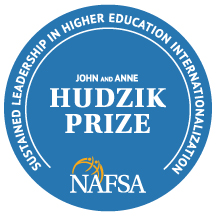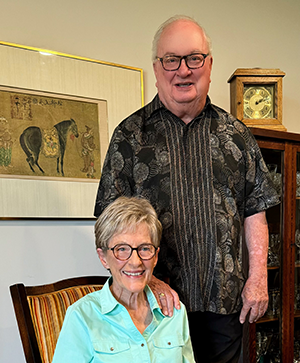The John and Anne Hudzik Prize for Sustained Leadership in Higher Education Internationalization (Hudzik Prize) was established by former NAFSA president and chair of the NAFSA Board of Directors, John K. Hudzik and his wife, Anne. The Hudzik Prize is awarded to individuals who have made sustained contributions to internationalization in areas including administrative leadership, community engagement, education, and scholarship.
Candidates from anywhere in the world may be nominated for the Hudzik Prize by individuals or organizations from any country. The recipient will be chosen by a committee composed of senior higher education professionals representing a broad array of internationalization experience and will receive a monetary prize of U.S. $5,000. No more than one Hudzik Prize can be bestowed each year.
The 2026 award nomination cycle is now open!
For more on the prize, read International Educator's interview with John Hudzik.
Call for Nominations
Deadline to apply is January 20, 2026.
About John and Anne Hudzik
John Hudzik, PhD, served as the Michigan State University (MSU) dean and vice president of international programs from 1995 to 2010 and as acting university provost in 2005. He has been a distinguished champion for internationalization and an authority on its planning and execution for decades. Hudzik served as NAFSA president from 2008-2010, as a NAFSA Senior Fellow in 2015 and 2020, and authored several NAFSA publications: Comprehensive Internationalization: From Concept to Action in January 2011 and Comprehensive and Strategic Internationalization: Lessons Learned and Prospects in 2018.
John and his wife, Anne, have been married for 49 years; their story is a result of global education. Originally from Australia, Anne was the manager at a hotel in London when John arrived with MSU students on a program in 1974. Thus began what John calls their “life-long cross-cultural experience.” “Anne is thoroughly an internationalist through years of experience, viewpoint, and values,” he says:
"I hope the prize enables more individuals to step up to the plate and to be inventive contributors to the next generation of thinking about internationalization. And what I really hope is that the prize will call attention to the role of individual leaders and thinkers in advancing this field of internationalization." – John Hudzik
Watch the Acceptance Video of the 2025 Winner


